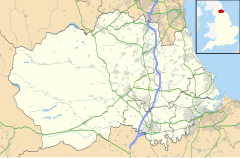
Holwick

| Holwick | |
|---|---|
 | |
Location within County Durham | |
| Population | 75 (2021 census) |
| OS grid reference | NY905269 |
| Civil parish |
|
| Unitary authority | |
| Ceremonial county | |
| Region | |
| Country | England |
| Sovereign state | United Kingdom |
| Post town | Barnard Castle |
| Postcode district | DL12 |
| Police | Durham |
| Fire | County Durham and Darlington |
| Ambulance | North East |
| UK Parliament | |
Holwick is a hamlet[1] and civil parish in Teesdale, County Durham (district), England. Located in the Pennine hills, the hamlet consists of a few houses spread along a road in the pattern of a linear settlement. The population of the parish taken at the 2021 Census was 75.[2]

Being south of the River Tees, Holwick lies within the historic boundaries of the North Riding of Yorkshire.[3] Along with the rest of the former Startforth Rural District it was transferred to County Durham for administrative and ceremonial purposes on 1 April 1974, under the provisions of the Local Government Act 1972. In May 2013, the newly registered flag of the North Riding was first unveiled at the village, owing to its being one of the most northerly settlements in Yorkshire.[4]

It has a public house, the Strathmore Arms, named after local landowner, Lord Strathmore, who owned Holwick Hall.[5] New York businessman Harry Payne Whitney leased Holwick Hall for a grouse shooting party on the moors in 1911,[6] while in 1923 the future King George VI and Queen Elizabeth holidayed at the hall.[7]

Geography
Holwick sits not far from the south bank of the River Tees, about 2 miles north-west of Middleton-in-Teesdale and opposite Newbiggin, both villages on the other side of the river. The Tees forms almost all the northern parish boundary; the River Lune its eastern and Blea Beck its western. Bleabeck Force is a series of waterfalls along Blea Beck before it joins the Tees opposite Force Garth Quarry.[8] Nearby are the High Force and Low Force waterfalls. The surrounding landscape is high moorland and fells.

History
The earliest evidence of habitation in the area comes from Mesolithic microliths dating back at least 6000 years. The people who left them, however, were not settled in the area, but hunted there during the summer. Agriculture began in the Neolithic period, and the remains of a Bronze Age hut circle and burial cairns are on Holwick Fell.[9] Evidence of a native settlement in Roman times in the form of groups of circular huts and field system has been found west of the Wynch Bridge.[10] The present-day village of Holwick was first recorded in 1235. The origin of the name is uncertain, but believed to mean either "dairy farm in a hollow" or "in the holly". In addition to hill farming of sheep, lead mining and iron smelting was conducted in the mediæval period, with lead mining and stone quarrying increasing in importance throughout Teesdale in the 18th century. The Wynch Bridge, thought to be the first suspension bridge in Britain, was built across the Tees near Holwick in 1704, and collapsed in 1802, killing one. It was repaired but finally replaced in 1830. Substantial quarrying and lead mining did not continue into the 20th century, and the economy of the village has since returned to sheep farming.[11]

Administration
Holwick has a parish meeting rather than a parish council, owing to its small electorate.[12]

The parish falls within the Barnard West electoral division of County Durham district and Bishop Auckland UK Parliament constituency.[13]

The local police force is Durham Constabulary. Holwick is in the Wear and Tees division and its nearest police station is in Barnard Castle.

References
- ^ "Ordnance Survey Open Data Names Download (NY82)". Ordnance Survey Data Hub. Ordnance Survey. Retrieved 2 January 2025.
- ^ "Data query: PP002 Sex. All usual residents in parish - Holwick". NOMIS. Retrieved 5 January 2025.
- ^ Himelfield, Dave (22 November 2020). "The remote village once on the tip of Yorkshire - and people wish it still was". Yorkshire Live. Retrieved 2 January 2025.
- ^ Braddy, Adrian (7 May 2013). "New flag for North Riding of Yorkshire unveiled at Holwick in Teesdale". Dalesman. Retrieved 5 October 2017.
- ^ Douglas, Andrew (27 September 2014). "The story of Holwick's Strathmore Arms". The Northern Echo. Retrieved 3 January 2025.
- ^ "Whitney's sport expensive". Vol. LX, no. 19575. The New York Times. 29 August 1911.
- ^ Sinclair, David (1979). Queen and Country : The Life of Elizabeth the Queen Mother. J M Dent & Sons. p. 73. ISBN 978-0-460-04436-3.
- ^ Fellows, Griffith (2003). The Waterfalls of England: A Practical Guide for Visitors and Walkers. Sigma Leisure. p. 22. ISBN 978-1-85058-767-5.
- ^ Historic England. "Burial cairns, burnt mound, Roman native settlement, medieval settlement with field system and iron industry remains, and five shielings on Holwick Fell (1019860)". National Heritage List for England. Retrieved 4 January 2025.
- ^ Historic England. "Roman period native settlement and field system 260m west of Wynch Bridge (1021094)". National Heritage List for England. Retrieved 4 January 2025.
- ^ "Local History: Holwick (County Durham)". keystothepast.info. Durham County Council. Archived from the original on 3 January 2025. Retrieved 3 January 2025.
- ^ "Holwick Parish Meeting". cdalc.info. Retrieved 3 January 2025.
- ^ "Election Maps". www.ordnancesurvey.co.uk. Retrieved 3 January 2025.
External links
![]() Media related to Holwick at Wikimedia Commons
Media related to Holwick at Wikimedia Commons


See what we do next...
OR
By submitting your email or phone number, you're giving mschf permission to send you email and/or recurring marketing texts. Data rates may apply. Text stop to cancel, help for help.
Success: You're subscribed now !

